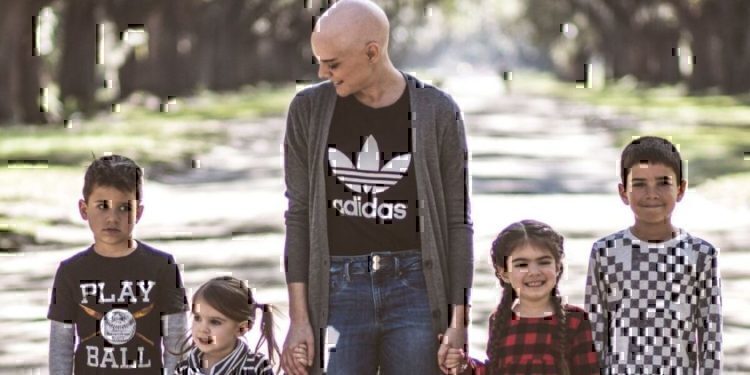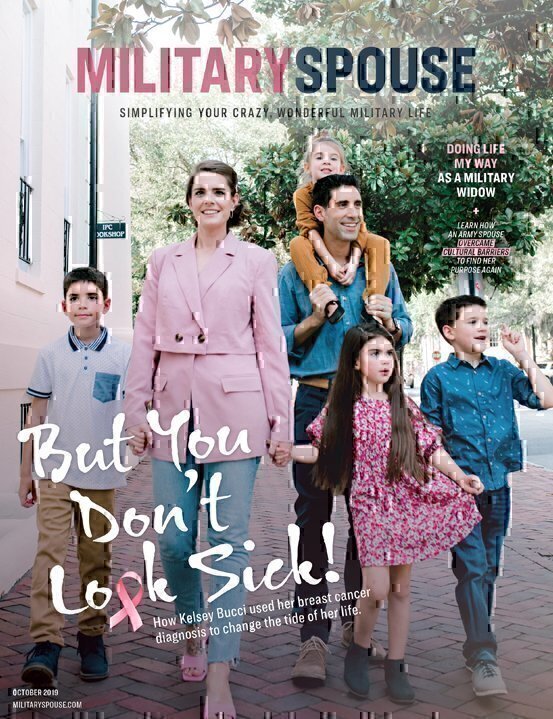“I want military spouses to know they can get a second opinion, find your own team of doctors who you feel comfortable with and who you feel you can talk openly with. You will see these people on a weekly basis and, in the beginning, a daily basis.”
Kelsey Bucci is an Army Reserve spouse, mom of four, business owner, podcast developer, and wardrobe stylist based in Savannah, Ga. She’s also a breast cancer survivor, a title that led her to become a fierce champion for women’s health. After finding her own lump at age 30, and pushing for answers that led to her breast cancer diagnosis and eventual course of treatment, Kelsey firmly believes that every woman is her own best advocate. Here is Kelsey’s story…
I found my own lump after my 30th birthday. I had some very odd health issues that led me to an emergency room visit which prompted me to do a self-breast exam. After I felt the lump, something just didn’t quite sit right with me. The lump felt so weird; it wasn’t round and symmetrical. I knew I needed to see a doctor.
At first, I just went to my primary care manager as we had just moved to Savannah and I wasn’t set up with any other doctors at the time. I still had it in the back of my head that it was nothing and it wouldn’t go much further than a physical exam. But I was referred to get a mammogram and ultrasound. I went for my mammogram and the lump in my left breast looked suspicious. The ultrasound confirmed that a biopsy needed to be done. It took a little while for me to be formally diagnosed, but on Aug. 30, 2017, I was told I had Stage IIB Triple Positive Invasive Ductal Carcinoma, and Ductal Carcinoma In Situ (DCIS). My cancer was Stage IIB because it did spread to my lymph nodes. It was also HER2 positive, which is an aggressive form of breast cancer especially in young women.
I have always been on Tricare Standard, but when we moved to Savannah there was a military clinic close to where we lived so we switched to Tricare Prime. When I went in for my mammogram, ultrasound, and biopsies I was seen at a military hospital. They did not have a pathologist onsite, so my samples were sent elsewhere, which meant it would take anywhere from 10 to 14 business days to get results. This was troubling because my samples were damaged twice, which prolonged my diagnosis. Tricare was very good about letting me switch to Standard so that I could go to in-network providers in Savannah. I found the most incredible team of doctors who moved with a sense of urgency to get me diagnosed and starting treatment.
Tricare has been amazing with all of my treatments and surgeries and I feel very fortunate to have been approved for all of the new treatment options that have become available to me. My treatment started out with six rounds of chemotherapy, followed by a bilateral mastectomy and full axillary node dissection, 25 rounds of radiation, 18 rounds of Herceptin (targeted immunotherapy drug), exchange surgery with reconstruction, ongoing hormone therapy, and a year of at-home chemotherapy. I was in active treatment for a year (which included chemo, surgery, and radiation), but I went in for infusions every three weeks for six months for an immunotherapy drug after chemo ended. I will also continue with hormone therapy for the next 10 years, which consists of monthly shots and a daily pill. I will soon be finishing up an at-home targeted immunotherapy drug known as Nerlynx.
I wish people knew so much more about breast cancer. I wish young women knew how important it is to do self-breast exams, to get your yearly well women’s exam, and to know their genetic risks. I have no history of breast cancer in my family, and I naivel thought that I did not need to be thinking about it.
Early detection can save your life and advocating for your own health is the best thing you can do, mentally and physically. Cancer is just as much of a mental game as it is a physical one. Stay positive. Surround yourself with uplifting people and find others who know what you are going through. Cancer can feel so lonely because unless you have heard those terrifying words, it is hard to relate. You can feel very isolated from your friends and family because they are dealing with it on a different level.
As you go through treatment and you no longer “look sick,” people will assume that you are “cured,” but you know the fear and anxiety that you now have to live with. There is nothing easy about it, but finding people that you can talk openly with, and even crack a few cancer jokes with, makes all the difference. Breast cancer changed me in ways that I will forever be grateful for. I began to live my life without fear, to take risks, to make my dreams a reality and not wait for my situation to be “ideal.”
After my breast cancer diagnosis, I started a podcast called “But You Don’t Look Sick” to help give a raw and real account of what it is like to go through breast cancer treatments, and I started a clean beauty and lifestyle store called Paris Laundry. Breast cancer taught me that true happiness is my own responsibility and no one else’s; and that getting knocked down in life is unfortunate, but staying down is a choice.









